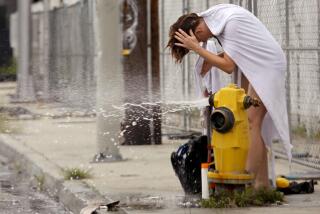Op-Ed: Justice takes to the streets of L.A.
Since charter reform paved the way for neighborhood councils, Los Angeles has made steady progress toward a more neighborhood-centered government. But up to now, that hasn’t included neighborhood-centered justice.
Community members should be able to see the tangible impact of the justice system on their streets and to participate more deeply in shaping criminal justice solutions, especially when it comes to the quality-of-life crimes that can make streets and parks dangerous or business districts uninviting.
In a first step toward neighborhood-centered justice, our Neighborhood Prosecutor Program has brought together deputy city attorneys and neighborhood leaders to identify and tackle local public safety priorities. In just a few weeks, there will be a neighborhood prosecutor in each of the city’s 21 police divisions.
The next step is Los Angeles’ first Neighborhood Justice Program, which will roll out next month. Although the traditional, incarceration-oriented criminal justice system can be effective, it can be remote from daily community life. Neighborhood Justice is designed to connect closely to the special character of each L.A. neighborhood, targeting low-level offenses that the current system often fails to handle effectively.
Neighborhood Justice will rely on trained community volunteers knowledgeable about their neighborhoods’ quality-of-life challenges, and a system of services designed to prevent offenders from repeating their crimes. The program is based on principles of restorative justice: An offender should take responsibility for his conduct; he should help restore what has been taken from the individual and the community victimized by his conduct; community members should take an active role in shaping what that restoration entails; and the offender should be required to take advantage of services designed to reduce the likelihood of recidivism.
Take the example of a first-time offender who was apprehended by police while scrawling graffiti on the side of a neighborhood store. Our office will contact him to determine whether he is prepared to take responsibility for his actions — and, if so, whether he chooses to participate in Neighborhood Justice. If he completes our program, there will be no criminal filing.
Instead, he will appear before a community panel consisting of trained volunteers from the area where the offense occurred. They will discuss with him the impact of defacing the business owner’s wall, noting that the crime not only victimized the business owner but degraded the community. The business owner may also participate in the panel, explaining how the vandalism affected his business. The panel will require the offender to accept responsibility for his actions. Because panelists know the community best, they will decide what actions the offender must take to help restore what the business owner and the community lost.
A member of the city attorney’s staff will participate too. After listening to the panel’s dialogue with the offender and raising additional questions, the staffer will direct the offender to take advantage of services — perhaps counseling or job training — designed to lessen the likelihood he will have further contact with the criminal justice system.
Offenders successfully completing these steps will be released from the program. Those who fail to follow through will be prosecuted, and their cases will proceed through a traditional route.
We’re now recruiting volunteers, and in community meetings across Los Angeles, Neighborhood Justice seems to be striking a chord. Residents know jails are overcrowded and courts overburdened, and they appear eager to help shape practical solutions that could lead to sustained improvements in their neighborhoods. They’re excited at the chance to help turn offenders’ lives around.
The Neighborhood Justice and Neighborhood Prosecutor programs are just two components of our new Community Justice Initiative. We’re already implementing additional elements of these integrated, neighborhood-centered innovations, ranging from comprehensive approaches to reducing gang and gun violence to improving safety and health near school sites.
Fresh approaches to engaging the community can advance criminal justice and improve public safety.
Mike Feuer is the Los Angeles city attorney. He previously chaired the California Assembly’s Judiciary Committee, was the Assembly majority policy leader and represented the 5th District on the L.A. City Council.
Follow the Opinion section on Twitter @latimesopinion
More to Read
A cure for the common opinion
Get thought-provoking perspectives with our weekly newsletter.
You may occasionally receive promotional content from the Los Angeles Times.






